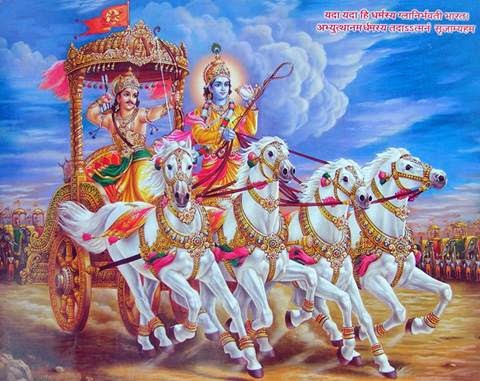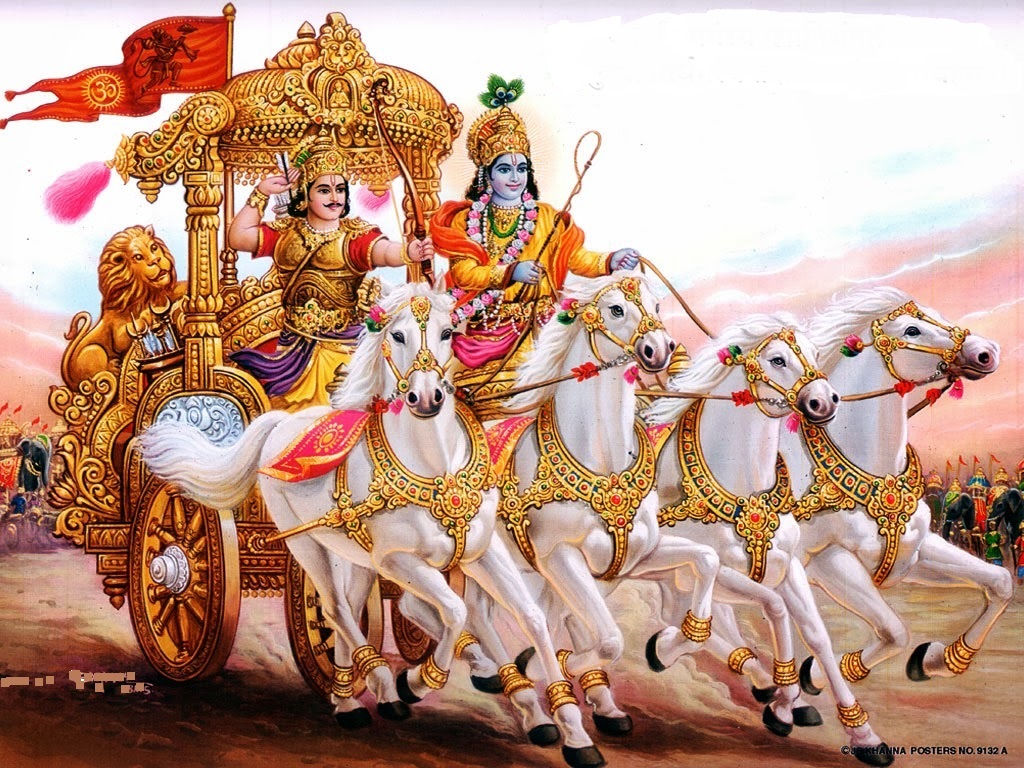Srimad Bhagavadgeeta : Ch-9. Slo-25.
Tuesday, July 08, 2014.
Srimad Bhagavadgeeta:
Chapter-9. ( Raja-vidya-raja-guhya-yogam ).
Slokam-25.
This slokam : Explains- While meditating on Paramatma - The result arrived- because of 'Bhavana-bhedham" ( the difference/ gap/ separation/distance, in the meditator's mind's experiences).
Yanti devavrata devan pitrun yanti pitruvratah,
Buthani yanti butegyah yanti madyaginopi mam.
Devavratah = One who devote Deva,
Devan yanti = Attain Deva;
Pitruvratah = One who devote Pitrus ( Ancestors),
Pitrun yanti = Attain Pitrus;
Butegyah = One who devote Budhas ( Elements ),
Bthani yanti = Attain Buthas;
Madyaginah = One devote me( Lord/ Paramatma),
Mam api yanti = Attain me ( Paramatma /Infinite/Eternal ).
It is law of Nature, that one becomes /attains according to his bhavana ( thoughts/ experiences of mind ), --"Yad bhavah tad bhavati." One individual's today's sangalpas ( nature of mind ), --tomorrow's ruparekha ( picture ) of his character. This can be experienced by one's own life's experiences, anybody can grasp this truth. This law of psychology is applicable to spirituality too. Thus Lord Krishna says "Those have aradhana ( devotion) towards Deva, Attain Deva."
Devas represent Indriyas, this we already knew, The word Deva- means all about Idriyas, here one should understand this point well. Those, who are active in the experiences of external worldly objects, they achieve success, because of their interest and concentration on that, - this is the truth.
Pitrus ( ancestors ), as they are early generations, those who have devotion to ancestors means those who try to follow, the values and principles of their ancestors only.-this is the truth.One who respect our Arshabharatha adyatmic culture, and live according to that parampara, he is attaining the the complete divine beauty in his divine life, - automatically, this is the truth.
In all societies, apart from the Adyatmic lakshya(spiritual goals), the curiosity to know the nature and its secrets, and made discoveries, sincerely. The outer world is the place for all search and enquiries ( to our ancestors ). Therefore those who have devotion on Budhas ( elements ) means the science and scientific activities. They ( devotees ) of Budhas, travel deep into the various branches, such as Physics, Chemistery, Biology, Agriculture, Medicine, Engineering, social sciences and so on. In Atharva veda there is detailed part about laws of nature and their characteristics explained from the observations of ancient Rishies.Lord Krishna pointing the tattvam ( principle ) of mind science, which is applicable to all other sciences too, this is the truth.
According to the same tattvam ( principle ), Lord Krishna give assurance - "Those have devotion on me ( Paramatma ), will attain Paramatma." Those who "With concentrated mind, regularly meditate the Atmasvaroopam ( Infinite/ Eternal ) they are united with Paramatma. Thus, in this way, Jeevatma, through, meditation achieve the status of Paramatma. In the primary texts of vedantham, the above idea is explained with the example of "Bramara-keeda-nyayam ( the life-cycle of butterfly .. egg,worm, pupa...so on ).
The effort of Bhagavadgeeta is to provide not only Jnanam ( Knowledge of Atma) but also Vijnanam ( Science ). In the outer world, in any areas of karmam, if with dedication and regular sincere activity is followed, then, thereafter, success is certain. Likewise in the inner world ( Spiritual field ) regular practice results in the success. This slokam is focusing this point.
Now , the devotion alone is of no use, following the Direction of Vedas is also inevitable, is it not? ..... ( this opinion of Sri Krishna follows in the next slokam.




Comments